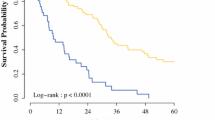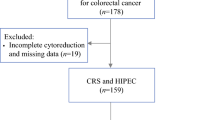Abstract
Purpose
The primary objective of this study was to determine the incidence rate of pathological complete responses (pCRs) following neoadjuvant systemic chemotherapy for the treatment of peritoneal carcinomatosis (PC) of colorectal origin. The secondary objective was to evaluate whether pathological response assessments predict survival of patients treated with curative intent by complete cytoreductive surgery (CRS).
Methods
A retrospective review was performed of 115 patients who underwent preoperative irinotecan- or oxaliplatin-based chemotherapy, followed by 124 procedures of complete CRS alone or combined with hyperthermic intraperitoneal chemotherapy (HIPEC). The pathological response was defined as the mean percentage of cancer cells remaining within all specimens. Univariate and multivariate analyses were performed to identify predictors of survival and pathological response outcome.
Results
Twelve procedures (9.7 %) resulted in pCRs, defined as no residual cancer cells in all specimens, 25 (20.2 %) resulted in major responses (1 to 49 % residual cancer cells), and 87 (70.1 %) resulted in minor or no responses (>50 % residual cancer cells). The cumulative 5-year survival rates were 75 and 57 % for patients with pCR and major responses, respectively. Using multivariate analysis, pathological response was the only independent predictor of survival (P = 0.01; major response: hazard ratio [HR] = 4.91; minor response: HR = 13.46). No significant predictor of pathological response was identified.
Conclusions
Pathological complete response can be achieved with preoperative systemic chemotherapy for patients with PC of colorectal origin. The degree of pathological response can be assessed and represented as a new outcome for prognosis following treatment with curative intent.


Similar content being viewed by others
References
Yan TD, et al. Systematic review on the efficacy of cytoreductive surgery combined with perioperative intraperitoneal chemotherapy for peritoneal carcinomatosis from colorectal carcinoma. J Clin Oncol. 2006;24(24):4011-9.
Yan TD, Sim J, Morris DL. Selection of patients with colorectal peritoneal carcinomatosis for cytoreductive surgery and perioperative intraperitoneal chemotherapy. Ann Surg Oncol. 2007;14(6):1807-17.
Verwaal VJ, et al. Long-term survival of peritoneal carcinomatosis of colorectal origin. Ann Surg Oncol. 2005;12(1):65-71.
Goere D, et al. Is there a possibility of a cure in patients with colorectal peritoneal carcinomatosis amenable to complete cytoreductive surgery and intraperitoneal chemotherapy? Ann Surg. 2013;257(6):1065-71.
Cao C, et al. A systematic review and meta-analysis of cytoreductive surgery with perioperative intraperitoneal chemotherapy for peritoneal carcinomatosis of colorectal origin. Ann Surg Oncol. 2009;16(8):2152-65.
Shen P, et al. Peritoneal surface disease from colorectal cancer: comparison with the hepatic metastases surgical paradigm in optimally resected patients. Ann Surg Oncol. 2008;15(12):3422-32.
Cao CQ, et al. Comparison of optimally resected hepatectomy and peritonectomy patients with colorectal cancer metastasis. J Surg Oncol. 2009;100(7):529-33.
Kopetz S, et al. Improved survival in metastatic colorectal cancer is associated with adoption of hepatic resection and improved chemotherapy. J Clin Oncol. 2009;27(22):3677-83.
Elias D, et al. Peritoneal colorectal carcinomatosis treated with surgery and perioperative intraperitoneal chemotherapy: retrospective analysis of 523 patients from a multicentric French study. J Clin Oncol. 2010;28(1):63-8.
Rubbia-Brandt L, et al. Importance of histological tumor response assessment in predicting the outcome in patients with colorectal liver metastases treated with neo-adjuvant chemotherapy followed by liver surgery. Ann Oncol. 2007;18(2):299-304.
Blazer DG 3rd, et al. Pathologic response to preoperative chemotherapy: a new outcome end point after resection of hepatic colorectal metastases. J Clin Oncol. 2008;26(33):5344-51.
Folprecht G, Kohne CH, Lutz MP. Systemic chemotherapy in patients with peritoneal carcinomatosis from colorectal cancer. Cancer Treat Res. 2007;134:425-40.
Kohne CH, et al. Clinical determinants of survival in patients with 5-fluorouracil-based treatment for metastatic colorectal cancer: results of a multivariate analysis of 3825 patients. Ann Oncol. 2002;13(2):308-17.
Klaver YL, et al. Peritoneal carcinomatosis of colorectal origin: Incidence, prognosis and treatment options. World J Gastroenterol. 2012;18(39):5489-94.
Jacquet P, Sugarbaker PH. Clinical research methodologies in diagnosis and staging of patients with peritoneal carcinomatosis. Cancer Treat Res. 1996;82:359-74.
Sugarbaker PH. Peritonectomy procedures. Ann Surg. 1995;221(1):29-42.
Glehen O, Gilly FN. Quantitative prognostic indicators of peritoneal surface malignancy: carcinomatosis, sarcomatosis, and peritoneal mesothelioma. Surg Oncol Clin N Am. 2003;12(3):649-71.
Franko J, et al. Treatment of colorectal peritoneal carcinomatosis with systemic chemotherapy: a pooled analysis of north central cancer treatment group phase III trials N9741 and N9841. J Clin Oncol. 2012;30(3):263-7.
Hasovits C, Clarke S. Pharmacokinetics and pharmacodynamics of intraperitoneal cancer chemotherapeutics. Clin Pharmacokinet. 2012;51(4):203-24.
Dedrick RL, et al. Pharmacokinetic rationale for peritoneal drug administration in the treatment of ovarian cancer. Cancer Treat Rep. 1978;62(1):1-11.
Benoist S, et al. Complete response of colorectal liver metastases after chemotherapy: does it mean cure? J Clin Oncol. 2006;24(24):3939-45.
Shindoh J, et al. Optimal morphologic response to preoperative chemotherapy: an alternate outcome end point before resection of hepatic colorectal metastases. J Clin Oncol. 2012;30(36):4566-72.
Benoist S, Nordlinger B. The role of preoperative chemotherapy in patients with resectable colorectal liver metastases. Ann Surg Oncol. 2009;16(9):2385-90.
Nordlinger B, et al. Perioperative chemotherapy with FOLFOX4 and surgery versus surgery alone for resectable liver metastases from colorectal cancer (EORTC Intergroup trial 40983): a randomised controlled trial. Lancet. 2008;371(9617):1007-16.
Chua TC, et al. Influence of modern systemic therapies as adjunct to cytoreduction and perioperative intraperitoneal chemotherapy for patients with colorectal peritoneal carcinomatosis: a multicenter study. Ann Surg Oncol. 2011;18(6):1560-7.
Passot G, et al. Progression following neoadjuvant systemic chemotherapy may not be a contraindication to a curative approach for colorectal carcinomatosis. Ann Surg. 2012;256(1):125-9.
Acknowledgment
FRENCH (Fédération de Recherche EN Chirurgie) for study design.
Conflict of interest
Data collection creation used in the study was supported by Roche.
Author information
Authors and Affiliations
Corresponding author
Rights and permissions
About this article
Cite this article
Passot, G., You, B., Boschetti, G. et al. Pathological Response to Neoadjuvant Chemotherapy: A New Prognosis Tool for the Curative Management of Peritoneal Colorectal Carcinomatosis. Ann Surg Oncol 21, 2608–2614 (2014). https://doi.org/10.1245/s10434-014-3647-0
Received:
Published:
Issue Date:
DOI: https://doi.org/10.1245/s10434-014-3647-0




